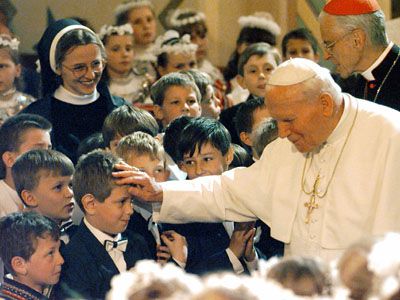What is Christian Humanism?
by CAPP-USA

Christian humanism is acknowledging our God-given dignity and our purpose to serve Him through our fellow man.
The Definition of Christian Humanism
Christian Humanism is based on – and defends – the dignity and value of every person because we are created in the image and likeness of God.
“It is only in the mystery of the Word made flesh that the mystery of man truly becomes clear”. (Pope St. John Paul II, 3)
In fact, “A humanism which excludes God is an inhuman humanism.” (Pope Benedict XVI, 78)
Pope St. John Paul II and Christian Humanism
“No force on earth—neither the Nazis nor the communists, neither the secular general public nor the lukewarm Catholics, not even the criticism of dissident theologians—could deflect Pope John Paul II from the endeavor to rescue and express humanism in its properly Christian form.” (Archbishop J. Augustine Di Noia)
That is why Pope St. John Paul II captures the essence of Christian humanism, “in which natural values are united with those of the Revelation”. (World Mission Day, 1979)
He understood that man is body and spirit, a unity – so a humanism without Christ falls short of our real purpose.
Pointing out the vacuousness of movements purporting there is ‘good without God’, Pope St. John Paul II (joining St. Thomas Aquinas, Pope Leo XIII, and the spirit of Vatican II) declared “man comes from God and must return to him.” (Pope St. John Paul II, 5)
Combatting Secular Humanism
“The religion of the God who became man has met the religion of man who makes himself God.” (Pope St. Paul VI)
Modern, secular humanism insists we have no need of God or anything supernatural.
However, “There is no true humanism but that which is open to the Absolute, and is conscious of a vocation which gives human life its true meaning.” (Pope Benedict XVI, 16 – Quoting Pope St. Paul VI’s Populorum Progressio)
Only Christian humanism can bring about peace and justice.
Pope St. John Paul II “argued forcefully that…the eclipse of God conceals a terrible threat to human existence. When human beings stop seeing life as a gift from God, they see it as something over which they have authority and control. And then, my friends, as history shows, they are in the gravest danger.” (Archbishop J. Augustine Di Noia)
“[T]he Church is the servant of man, the Church believes in Christ who came in the flesh and therefore serves man, loves man and believes in man.” (Pope Francis, 3)
“The Church has…declared herself the handmaid of humanity”. (Pope St. Paul VI)
Catholic Social Teaching Directly Expresses Christian Humanism
Christian humanism emphasizes the dignity of the human person which “rooted in a correct view of the human person, is the prime principle of the Catholic social doctrine.” (Catechism of the Catholic Church, 1700)
Christian humanism is a “transcendent humanism which gives [to man] his greatest possible perfection: this is the highest goal of personal development”. (Pope St. Paul VI, 16)
“[T]he main thread and…the guiding principle…of all of the Church’s social doctrine, is a correct view of the human person and of his unique value”. (Pope St. John Paul II, 11)
So, Catholic humanism, expressed in the Church’s social teaching, seeks to promote a new social order (economic, political, and cultural) based on the dignity and freedom of every individual.
The call is clear. “Respect, protect, love and serve life, every human life!” (Pope St. John Paul II, 5)
Read an Overview of the Principle of Human Dignity.
Read a Deeper Examination of Human Dignity.





